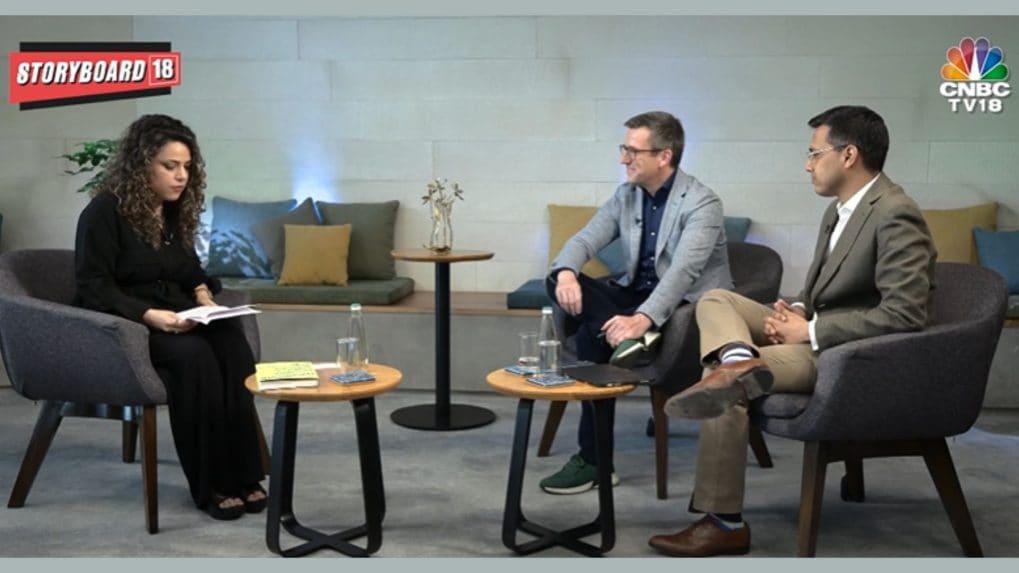Personalisation is first and foremost a people problem: BCG's Mark Abraham and Aarav Singhal
Personalization is a $2 trillion goldmine waiting to be tapped, yet many brands struggle to fully harness its power. In a candid chat with Storyboard18, BCG’s Mark Abraham and Aarav Singhal unpack the opportunities, hurdles, and AI-driven future of hyper-personalized marketing.
ADVERTISEMENT
In an age dominated by artificial intelligence and data-driven strategies, the promise of hyper-personalization is more tangible than ever before. In the latest episode of Media Dialogues with Storyboard18, Delshad Irani sat down with two leaders from Boston Consulting Group who are driving this change: Mark Abraham, Managing Director & Senior Partner at BCG, and Aarav Singhal, Managing Director & Partner at BCG, to discuss the potential and challenges of personalization in modern marketing. The pair shared insights into the $2 trillion opportunity personalization presents, and how businesses can realize its full potential.
Understanding personalization: More than just a buzzword
Mark Abraham, also BCG's global personalization leader, emphasized the need to redefine personalization beyond mere buzzwords. "We define it as taking what you learn about a customer in one interaction and making their next interaction better, faster, cheaper, more convenient," Abraham explained. This approach moves beyond simple data points like customer names in emails to a more comprehensive understanding of customer needs.
Also Read: Gen Z: The $2 trillion force reshaping India's consumer landscape
The conversation highlighted the "five promises of personalization" detailed in Abraham's book, which are essential for businesses aiming to excel in personalization.
A critical aspect of this is understanding the customer's journey and using personalization not just for selling products, but for guiding and empowering customers through their decisions.
Aarav Singhal shed light on the current challenges businesses face in implementing effective personalization strategies. "There's two, three parts to it," Singhal noted, discussing both the technical and organizational hurdles.
About 65% of surveyed clients believe they lack the necessary technological stack to personalize effectively, hindering their ability to send offers and measure feedback efficiently.
Moreover, Singhal pointed out that the organizational challenge of rallying cross-functional team to work towards common personalization objectives. "Personalization is one of those things which is highly cross-functional," he says in his interview with Storyboard18, highlighting the need for collaboration between business, analytics, and tech teams.
The conversation then delved into how businesses can leverage AI to fulfil the promise of personalization.
Abraham introduced the concept of the personalization index, a tool developed by BCG to measure personalization success across companies. According to their research, only 10% of companies are classified as leaders in personalization.
Abraham pointed out that while many businesses have begun using GenAI tools, the real challenge lies in process optimization. "You can put all the GenAI you want into that process, if you don't streamline the process itself, you won't get the scalability of it," he emphasized.
Also Read: 90% of Indians approve of AI, 86% see real-life benefits, reveals KPMG Report
Looking ahead, Abraham and Singhal discussed the future evolution of personalization. Abraham proposed a shift from "push personalization" to "pull personalization," where AI-driven virtual assistants could anticipate and cater to customer needs seamlessly. He cited examples like L'Oréal's Beauty Genius and Delta's Concierge service as early adopters of this approach.
Singhal added that India, with its digital infrastructure and consumer openness, is well-positioned to capitalize on personalization advancements. "The tech has evolved quite rapidly... Many experiments are live in being able to use agentic AI for narrow use cases," he noted.
The discussion also touched on data privacy and regulatory concerns, which are increasingly important in personalization strategies. Singhal emphasized the importance of customer consent and data security. "The technological guardrails around how do you manage the data, they can counterbalance all the privacy concerns," he said.
Abraham added that transparency and responsible AI are crucial, mentioning Marriott's approach to data transparency as a positive example. "Brand are moving to this more transparent approach," he observed.
WATCH
Also Read: E-commerce adoption soars in India's smaller cities, to reach 65% share by 2030: Anarock report


